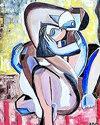学习水
IF 0.3
4区 社会学
0 HUMANITIES, MULTIDISCIPLINARY
ANGELAKI-JOURNAL OF THE THEORETICAL HUMANITIES
Pub Date : 2023-01-02
DOI:10.1080/0969725X.2023.2167788
引用次数: 0
摘要
摘要我用水教学。这并不是什么了不起的事情,我自己也不记得我是如何把水作为我必须教的东西的最方便的入门,也就是说,学习。不是一切都是从水开始的吗?无论如何,如果我自己的开始对我的生活(种族和阶级)和教学方式(传统、制度、地点)没有太多意义,我可以负责任地采取的自由,或者在通往集体学习体验的不可能的道路上,一个人可能不得不去登记并分享一种惊奇和愤怒的感觉。在这一期中,用水学习在很大程度上是关于回忆我们所知道的,知道我们用现有的知识做什么。我用水教学。我开始上课时,如果表面上是这样的话,我会悄悄地在全班同学面前或研讨会桌中央放一瓶“泉水”。然后,我邀请学生们去听这个众所周知的大象的课堂例子,尽管不一定像三个盲人那样绝望。本文章由计算机程序翻译,如有差异,请以英文原文为准。
LEARNING WATERS
Abstract I teach with water. It’s nothing very remarkable and I myself do not remember how I settled upon water as a most convenient introduction to what I have to teach, which is to say, to learn. Did not everything begin with water? My own beginnings, in any case, would border on the banal, if they did not signify so much about where I live (race and class) and how I teach (tradition, institution, location), the liberties I can responsibly take, or the sheer length to which one might have to go to register and partake of a sense of wonder – and of outrage – on the impossible path toward a collective experience of learning. In this particular instalment, learning with water is very much about recalling what we know, knowing what we do with the knowledge that we have. I teach with water. I start my class by quietly, if ostensibly, depositing in front of the class, or at the center of the seminar table, a bottle of “spring water.” I then invite the students to attend to this classroom instance of the proverbial elephant, though not necessarily true to the desperate manner of the three blind men.
求助全文
通过发布文献求助,成功后即可免费获取论文全文。
去求助
来源期刊

ANGELAKI-JOURNAL OF THE THEORETICAL HUMANITIES
HUMANITIES, MULTIDISCIPLINARY-
CiteScore
0.60
自引率
33.30%
发文量
57
期刊介绍:
Angelaki: journal of the theoretical humanities was established in September 1993 to provide an international forum for vanguard work in the theoretical humanities. In itself a contentious category, "theoretical humanities" represents the productive nexus of work in the disciplinary fields of literary criticism and theory, philosophy, and cultural studies. The journal is dedicated to the refreshing of intellectual coordinates, and to the challenging and vivifying process of re-thinking. Angelaki: journal of the theoretical humanities encourages a critical engagement with theory in terms of disciplinary development and intellectual and political usefulness, the inquiry into and articulation of culture.
 求助内容:
求助内容: 应助结果提醒方式:
应助结果提醒方式:


